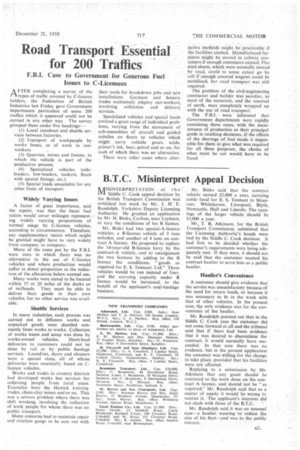B.T.C. Misinterpret Appeal Decision
Page 57

If you've noticed an error in this article please click here to report it so we can fix it.
MISINTERPRETATION ot the Siddle C. Cook appeal decision by the British Transport Commission was criticized last week by Mr. J. H. E. Randolph, Yorkshire Deputy Licensing Authority. He granted an application by Mr H. Binks, Carbon, near Lcyburn, to vary the conditions of his B licence.
Mr. Binks had two special-A-licence vehicles, a B-licence vehicle of 3 tons unladen, and another of 4 tons on contract A licence. He proposed to replace the 14-year-old B-licence lorry by the contract-A vehicle, and to amalgamate the two licences by adding to the B licence the conditions. "goods as required for E. S. Tennant, Ltd." Three vehicles would be run instead of four, and the carrying capacity under B licence would he increased, to the benefit of the applicant's coal-haulage business, Mr. Binks said that the contract vehicle earned £2,000 a year, carrying cattle food for E. S. Tennant to Stranraer, Whitehaven, Liverpool, Blyth, Newcastle, Hull and Lincoln. The earnings of the larger vehicle should be 0,000 a year.
Mr, T. B. Atkinson, for the British Transport Commission, submitted that the Licensing Authority's hands were tied by the Siddle C. Cook decision. It had first to be decided whether the customer's requirements were being adequately met. If they were, it should not be said that the customer wanted his contract haulier to serve him as a public haulier.
Haulier's Convenience A customer should give evidence that the service was unsatisfactory because of the need for return loads, or because it was necessary to fit in the work with that of other vehicles. In the present case, the only evidence was for the convenience of the haulier.
Mr. Randolph pointed out that in the Siddle C. Cook case the customer did not come forward at all and the tribunal said that if there had been evidence that it was desired to discontinue the contract, it would normally have succeeded. In that case there was no evidence, but in the present application the customer was willing for the change to take place, provided that his facilities were not affected.
Replying to a submission by Mr. Atkinson that any grant should be restricted to the work done on the contract A licence, and should not be "as required," Mr. Randolph said that as a matter of equity it would be wrong to restrict it. The applicant's interests did not clash with those of the B.T.C.
Mr. Randolph said it was an unusual case—a haulier wanting to reduce the size of his fleet—and was in the public interest.




























































































